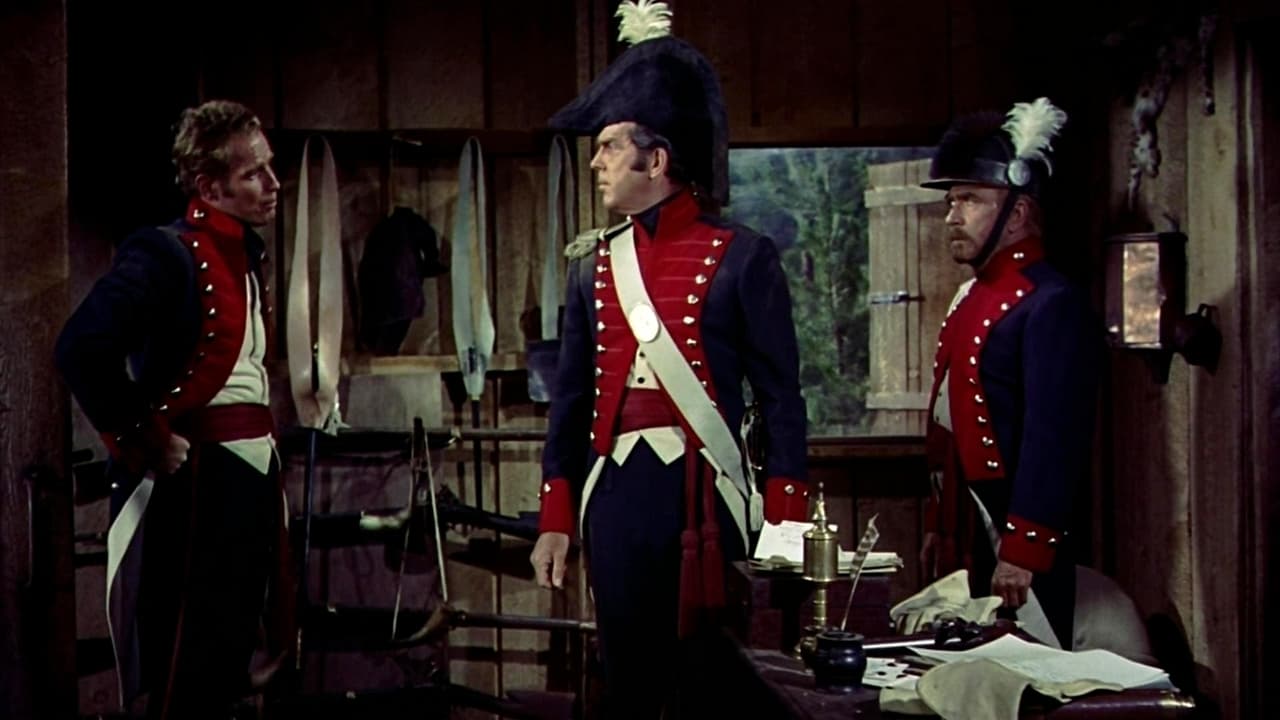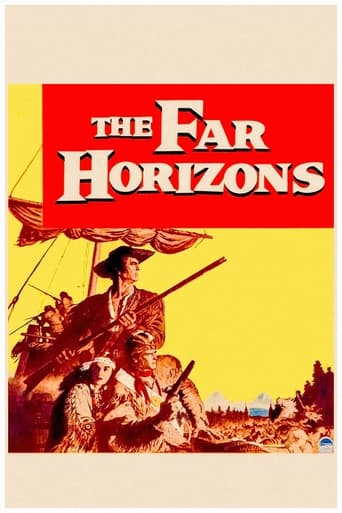

'The Far Horizons' is a film in which an expeditionary force, commanded by Captain Meriwether Lewis (Fred MacMurray) and Lt William Clark (Charlton Heston), sets out to explore newly acquired US territory. The film begins with an atmospheric party at which the news of the American expansion is broken, and arrangements are made to investigate. Subsequent scenes are ominous and foretelling, and handle this effect quite well. Sadly, it tends to go downhill from there. Although MacMurray, Heston and Donna Reed (who plays a helpful young Native woman and romantic interest of Lt Clark) play their parts well, the uncertainty of the surveyors' mission renders the film's direction ambiguous at times. The cinematography is in parts very good, and the tedious, repetitive shots that I usually associate with maritime films are satisfyingly rare in 'The Far Horizons'. However, some of the choreography isn't very good, and one or two fight scenes appear pretty poorly designed. Also, many of the Natives are depicted as being quite flat in character and lacking in opinion, and so not many of the supporting cast and extras perform dynamically. The final scenes of the film attempt to be reflective, with a letter being read in a narrative form, but the mediocre and vague drama in the prior scenes lead to this delivery feeling unsubstantiated.
... View MoreSee this movie for the first time on TCM for a primer on Hollywood studio film making in the post-war '50s. Get The Journals of Lewis and Clark edited by Bernard DeVoto for the best story you will ever read about the discovery of the American West, and it's all true. The book is in libraries and at Amizon.com. Second choice: Undaunted Courage by Stephen Ambrose.The stars of the movie (Fred MacMurray, Charlton Heston, Donna Reed) are Hollywood legends but their acting is as uninspired as the script. William Demarest as Sgt. Gass is the only believable character. The combat scenes are total fiction. Only one member of the Corps of Discovery died (of an illness)and only one Indian was shot, for trying to steal a horse from Lewis one night in Monatana on the return trip.As others have reported, the love story is contrived but remains a fascination in Western romance novels about Sacajawea. The joke is on the film makers because The Journals ooze sex between the men of the Corps and women of some of the tribes. Lewis was the medic and half of his medicine it seems was used to treat the men suffering from venereal diseases.Read the book; maybe someday Hollywood will make the movie.Note to reviewers: Use of the term "squaw" has been politically incorrect for some time.
... View MoreA crucial event in American history is rendered dull and unexciting by Hollywood convention; the story of the Lewis and Clark expedition which in the early 1800s conquered unclaimed territory for the ever-growing United States. Production values are glossy and there are a few action highlights, but the handling is uninspired and the slowly-paced film emerges an undistinguished effort overall.Casting is variable: Fred MacMurray makes for a staid Lewis but Charlton Heston's Clark is, as ever, at home in such larger-than-life surroundings; Donna Reed (as an Indian squaw!) and Barbara Hale provide the none-too-convincing romantic interest - which actually takes up a good deal of the running-time (before the expedition, both men love Hale but she prefers Heston; when the latter meets up with Reed, they fall for each other - but complications of the boring variety arise when it's revealed that she's been promised by the tribe which has abducted her to a villainous French trapper/guide and, even when she finally escapes and goes back to her people, she's spoken for by a rash young Indian brave!). This allows Heston to engage in fisticuffs and he even falls out with MacMurray, but the audience's interest is never more than dimly aroused; however, veteran William Demarest is on hand as a level-headed sergeant who actually keeps the company together during such trying times.Anyway, the film is watchable enough in itself - though it's better approached, perhaps, as a Western rather than a widescreen spectacular (with which Heston would soon come to be identified)...and, in any case, it's miles behind such celebrated 'epics' of American colonialism as John Ford's DRUMS ALONG THE MOHAWK (1939) and King Vidor's NORTHWEST PASSAGE (1940).
... View MoreI think that the best thing this movie did to me was to unveil that wonderful character, namely Sacajawea, the Shoshone squaw who helped and guided the Lewis-Clark Expedition. After seeing it I discovered on a very old Reader's Digest issue something about her, just to realize that Sacajawea didn't have any romance with William Clark, because she was already a married woman, namely a guy named Charbonneau with whom she stayed till his death. The real Sacajawea story (or biography), as well as the real Lewis& Clark expedition, are certainly much more interesting than this Hollywood make believe-"historical" movie. For instance, it was lovely to know how Sacajawea was amazed to see a whale skeleton on a West Coast beach. However when she tried to tell this to her tribe's people, they just laughed at her, convicted that she was a liar, that no "fish" could be so big. So the "romantic" approach used in the screenplay, wasted a good opportunity to show either how fascinating the real expedition history has been or the cultural shock experienced by this simple Indian young woman when her tiny inner word was broadened by the unique opportunity she had to explore the unknown, together with the duo of white explorers and their fellows. Other than this, I remember how curious I was to differentiate the optical process used by Paramount (VistaVision) from the CinemaScope, the latter implemented by 20th Century Fox and other companies. Other than a sharper resolution, quite between us, it has been deceiving. In short, expeditions like the one the film stages, have a certain similarity with many similar expeditions carried out in Brazil, especially in the XVII century.The difference is that Lewis & Clark has been an official enterprise and the ones in Brazil have been a matter of private nature, mostly by adventurers, gold rushers, or cruel people seeking Indians for slavery, a thing that didn't work.Indians were either fragile as to Whites' diseases or too much independent to become slaves. So our Portuguese colonizers turned themselves to Africa.Too bad for it.But very good as to the splendid cultural heritage brought either by Africans or the mix of the three cultures:Indians,African and Portuguese Whites. Other than this I remember Donna Reed's performance, while I hardly remember Charlton Heston in his deep blue uniform. An I had forgotten Fred Mc Murray was on the film. In short, some thrill, some sightings in true Technicolor, but as to History, Hollywood just tried it...
... View More